
Lahore: Corruption is so pervasive in Pakistan that even Osama Bin Laden had to pay a bribe to build his hideout in the northwest where he was killed by US commandos.
Ordinary Pakistanis complain they have to grease officials’ palms to get even the most basic things done: File a police report when they have a traffic accident. Obtain copies of court documents. Get permission to see their relatives in the hospital.
Now, an enterprising group of officials is cracking down on this culture of graft with an innovative programme that harnesses technology to identify corruption hotspots in the country’s most populous province, Punjab.
The initiative, which leverages the ubiquitous presence of cellphones, relies on the simple concept of asking citizens about their experience.
But experts say it represents the first large-scale attempt by any government to proactively solicit feedback from citizens who are forced to pay bribes for basic public services and use that information to discipline officials.
“The strength of the model is that word gets out among officials that there is someone watching and there is someone who can make them accountable to what the public says,” said Nabeel Awan, a government official who has played a key role in the programme. “It may not eliminate corruption, but it does reduce corruption and bad administration.”
Huge losses
Pakistan’s anti-corruption wing recently estimated that graft costs the country billions of dollars each year. Pakistan slipped nine places to the 33rd most corrupt country in the world last year, out of a total of 176, according to Transparency International.
The issue could gain more relevance in the run-up to parliamentary elections expected in the spring. The vote will be watched closely by Washington, which relies on Pakistan to help fight Islamist militants and stabilise neighboring Afghanistan.
One of the candidates is former Pakistani cricket star Imran Khan, who has made fighting graft a key component of his party’s platform. That has put pressure on candidates from the country’s two main political powers, the ruling Pakistan People’s Party and the opposition Pakistan Muslim League-N. The PML-N controls the provincial government in Punjab, and the party may be hoping the anti-corruption initiative, which became fully operational in the middle of last year, will steal some of Khan’s thunder.
The programme — run by the Punjab Information Technology Board — uses telephone calls and text messages to get feedback from citizens conducting transactions with a dozen different government departments, including those dealing with property, health and emergency response.
Many of the reported cases of corruption involved low-level property officials known as patwaris, who are notorious for demanding bribes. One man in the city of Multan sent a text message saying he had to pay a patwari about $170 to get his new property registered. Another man in Sheikhpura district reported paying about $15 to a patwari and his assistant and said “they should be removed from their jobs.”
No one spared
Bin Laden’s courier, who built the Al Qaida chief’s compound in the town of Abbottabad, had to pay roughly a $500 bribe to a patwari to purchase the required land.
Under the programme, government clerks are required to log the cellphone numbers of citizens with whom they do business. The citizens then receive a robocall from Punjab’s top official, Shahbaz Sharif. The recorded call informs them that they will receive a text message asking if they had to pay a bribe, or whether they have any complaints.
Their responses are logged into a computer database. Call center agents also contact citizens who don’t respond in case they weren’t able to read the text message. So far, more than 1 million citizens have been contacted, and about 175,000 of those either responded to the text message or talked with a call centre agent. About 6,000 reported corruption. More than 18,000 others reported other types of complaints.













